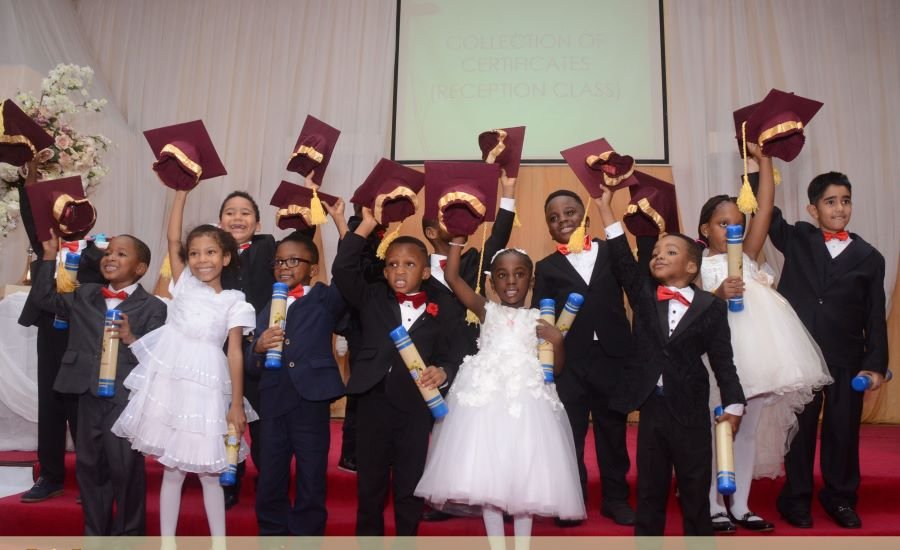SEVEN-YEAR-OLD Daniel’s tears over missing a graduation party opened old wounds for his mother, Funke Adeyemi. She still remembers paying almost ₦300,000 for her daughter’s celebration lavish costumes, photographers, levies, an amount that would crush many households.
Yet those photos remain a treasured source of happiness. The family’s dilemma is now Nigeria’s dilemma, as some state governments outlaw what was once a joyous rite of passage. News Point Nigeria explores how a childhood milestone became a lightning rod for controversy.
The wave began in Imo State, where on August 17, 2025, the government shocked parents and schools by announcing a total ban on graduation parties for nursery and JSS3 pupils. Only Primary 6 and SSS3 students, in line with Nigeria’s 6-3-3-4 education policy, would henceforth be allowed such ceremonies.
Prof. Bernard Ikegwuoha, the Commissioner for Education, justified the move as a way to reduce financial burden on parents and redirect attention to true academic milestones. The directive also stopped the yearly change of textbooks, mandating at least four years of use.
In quick succession, Edo, Ondo, Benue, Kogi, and Ebonyi States announced similar bans, each citing the same twin concerns: extravagant costs and moral decline.
“It is obvious that things have gone bad in the education sector; there are urgent issues we need to address so that we can bring back the lost glory,” declared Ondo’s Commissioner, Igbekele Ajibefun.
Over the past decade, Nigerian graduation ceremonies have grown into extravagant spectacles. Children as young as five arrive in SUV convoys, dressed in miniature tuxedos and ball gowns. In some cases, parents hire bands, print customised souvenirs, and even spray dollar bills on children.
One viral video from Abuja last year showed a JSS3 girl being chauffeured in a limousine, her classmates dancing behind in carnival-like fashion. Another clip captured pupils spraying foreign currency on one another while parents cheered.
For some Abuja and Lagos parents, these are not harmless displays but the National Orientation Agency (NOA) has warned that such trends encourage children to equate success with flamboyance rather than hard work.
“Early exposure to lavish celebrations distorts the values of humility and delayed gratification,” said NOA’s Director-General, Lanre Issa-Onilu.
For many parents, the ban is long overdue. With Nigeria’s economy still reeling from inflation and high school fees, graduation levies became the last straw.
“Last year, I was forced to pay ₦65,000 for my son’s nursery graduation. That’s aside from buying his outfit and a cake,” lamented Esther Akut, a parent in Kaduna. “We are not against celebrating children, but schools have turned it into business.”
Others argue that the money would be better spent on actual learning. “Half of what we pay for parties could buy textbooks, uniforms, or even extra lessons,” said education advocate, Maryam Munnir.
But school proprietors are less enthusiastic. For them, graduations are not just income-generating but also marketing tools. A colourful graduation draws prospective parents and enhances a school’s reputation.
Mrs. Omolara Olanipekun, a school principal in Kaduna, admitted: “We’ve seen graduations boost enrolments. Parents love pictures and videos. Banning it outright will affect schools’ appeal.”
Some educators also argue that graduations help children build confidence and create cherished family memories. “There shouldn’t an outright ban, I know a lot of pupils, who became socially confident after there graduation parties”, school owner, Bukola Ayeni argued.
Indeed, the loudest complaints are from pupils themselves. For them, graduations are milestones they look forward to. “We practise dances, take pictures, and feel proud,” said Fatima, a pupil in Kano.
“My siblings all have graduation albums. Why deny me that?” protested Collins, a JSS3 student in Abuja.
University undergraduate Talatu Ibrahim offered a middle ground: “Instead of banning, governments should regulate. Let parents choose whether to pay, or make ceremonies modest, like prize-giving days.”
Interestingly, no state in the North-West or North-East has officially joined the ban, despite past warnings.
In 2024, Kano prohibited unauthorised secondary school graduations, and Sokoto barred “sign-out” celebrations. Yet, unlike their southern counterparts, they have stopped short of a full ban.
In Katsina, authorities only issued guidelines against “excessive partying.” Commissioner Zainab Musa-Musawa warned that schools allowing misconduct would be sanctioned, but graduations themselves remain intact.
Some experts say the controversy reflects deeper struggles about Nigeria’s education culture. Should graduations be about celebrating effort, or about reinforcing discipline and values?
For sociologist Hassan Gumel, the solution is clear: “Graduations should return to simple prize-giving days or talent showcases. Let children be rewarded for learning, not luxury.”
Others call for innovation. “Why not let pupils showcase skills, do community service, or launch creative projects instead of pageantry?” suggested education consultant Osikoya.
As the bans spread, the debate is unlikely to fade. For now, parents appear to welcome the relief, schools resent the lost revenue, and pupils feel robbed of a cherished experience.
What remains clear is that Nigeria must decide whether graduation ceremonies will be remembered as launchpads for learning or breeding grounds for excess.







